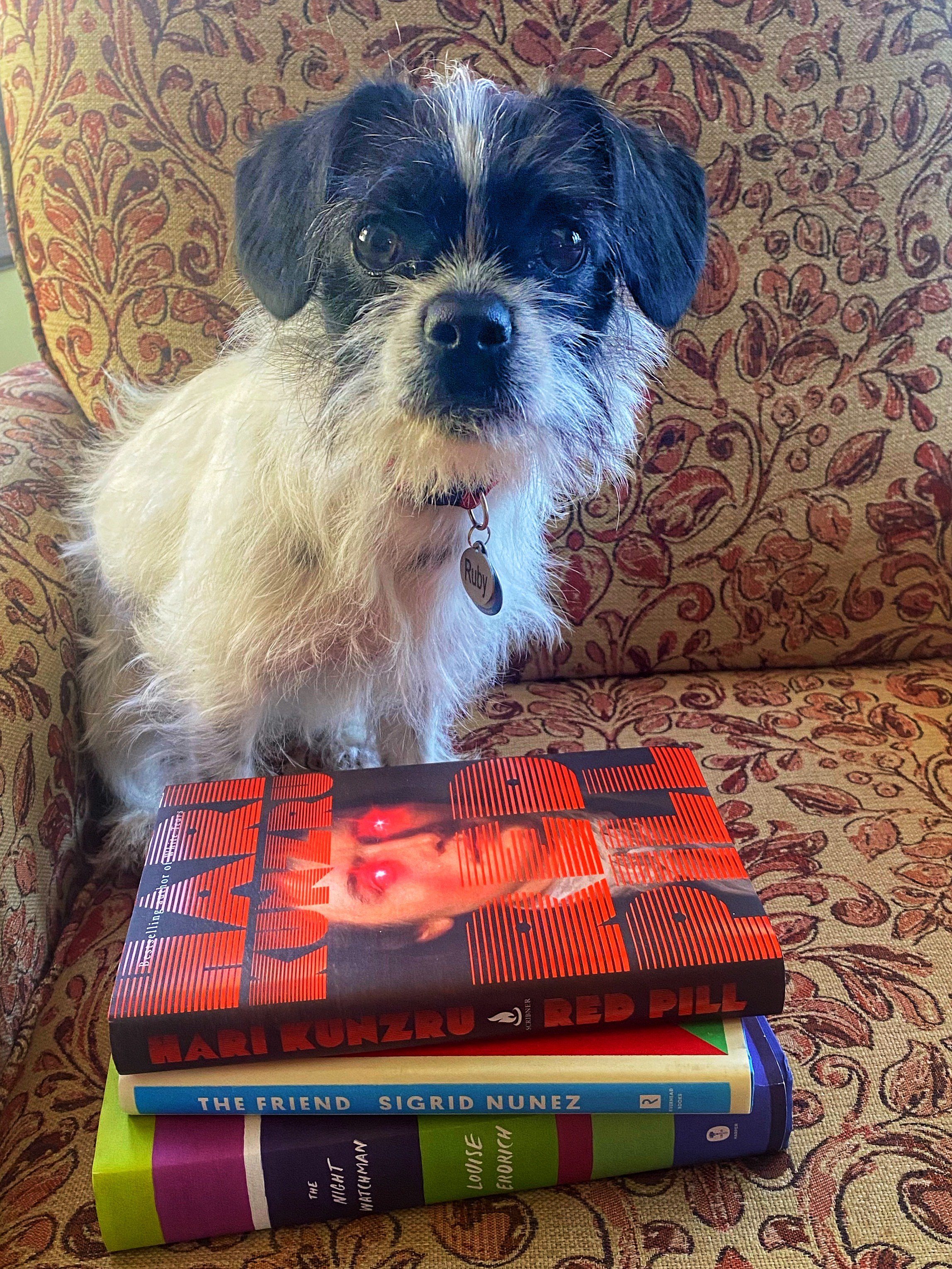The Auburn Conference v. The Bee Sting v. The Librarianist
The 2024 Tournament of Books, presented by Field Notes, is an annual battle royale among 16 of the best novels of the previous year.
MARCH 6 • PLAY-IN MATCH
The Auburn Conference
v. The Bee Sting
v. The Librarianist
Judged by Rufi Thorpe
Rufi Thorpe (she/her) received her MFA from the University of Virginia in 2009. She is the author of The Girls From Corona Del Mar, Dear Fang, With Love, and her most recent, The Knockout Queen, which was a finalist for the PEN/Faulkner award. Her fourth novel, Margo’s Got Money Troubles is forthcoming from William Morrow at HarperCollins in June 2024. She lives in California with her husband and two sons where she teaches at The Book Incubator. Known connections to this year’s contenders: None. / rufithorpe.com
As is well known, the Tournament of Books is an elaborate prank played on those who think they are capable of making aesthetic judgements. Because the organizers don’t send you two bad books and one good book. If you’re the play-in match judge, they send you three extremely good, but very different books.
First up, The Auburn Conference by Tom Piazza, a slender, clever, and beautifully researched account of an imaginary writers’ conference that could have—but did not—take place in 1883, which spirals so wildly out of control that it is never held again.
Next, a dreamy, wonderfully long, multi-pov family saga told in bouncy, painterly, almost Joycean prose. The Bee Sting by Paul Murray follows the Barnes family on their journey from prosperity to financial ruin, though their true downfall is the secrets they keep from each other.
And finally, The Librarianist by Patrick deWitt, which is a feverishly funny account of one retired librarian’s attempt to connect once more with the world of the living after a life lived almost exclusively through reading.
In trying to judge a winner between such very different books, I was forced to admit that the brass ring of artistic achievement is really only what does it for me, and any judgment I can offer is only a portrait of my homeliest readerly self, a being forged when I was 10 or so, who has undergone very little close examination in the decades since. But here is my attempt at an honest accounting of how I actually judged these three books.
Subject: Am I interested in what the book is about?
Is it drugs? Did I lose consciousness while reading it? I’m still chasing the absolute narcotic of the Sweet Valley High books.
Gay: I just like gay things better, I don’t stand behind it, I just happen to like gay things more.
Cerebral: I’m a nerd, I like thinking, I will read a whole book for one penetrating insight.
Characters: I know it’s not popular to say, but I want to like the fucking characters. I can’t be rolling my eyes every other page at their weenie-ish ways.
Plot: As a reader, I’m like a literal minded eight-year-old and plot holes get to me. Going to the movies with me is awful, I’m continually whispering things like, “But why would he do that?”
Does it vibrate strangely? This is the most ineffable category, but also the most important to me. Is the work so singularly itself that it has transcended in some way?
The Bee Sting by Paul Murray
Subject: The Bee Sting was my early favorite precisely because of the subject. Family epics are juicy; a love of Sally Rooney and Derry Girls have convinced me I like Irish things; I was ready to sign my life away. Score: 100
Is it drugs? For almost the first half, this was drugs for me, but this became less and less so as the book went on. Score: 50
Gay: This book is wonderfully gay! Hot gay sex, disturbing gay sex, inchoate yearning, this book has it all! Score: 100
Cerebral: This book is more about feeling than thinking, but it still gets its insights in. “They have arrived at a point, he and his daughter, where she can only be happy in his company if she feels she has bested him.” Score: 69
Characters: I am usually prepared to be judgmental of adult men writing teen girls, but the Cass character was great, not too saccharine or idealized. The teenage son PJ was harder for me because I just felt maybe his cornbread wasn’t done in the middle, and key plot points depended on his making poor decisions. The mom, Imelda, you have to respect the hustle and I like a mean bitch, but Dickie, her husband, drove me up the wall. Just be gay! Like, just man up and be super gay! Also, what was up with the pedophile character? Score: sad kitten in rain
Plot: Whooboy, plot-wise I was really clawing my eyes out. Maybe I am too American to understand these people? But this was Avoidable-Misunderstanding City! Score: sad kitten in rain getting even sadder
Does it vibrate strangely? Yes, it does. Especially in the sections about the fae [fairies], there is some real, powerful weirdness going on. Score: 100
Total score: 419 + super sad kitten in rain
FROM OUR SPONSOR
The Auburn Conference by Tom Piazza
Subject: This is a book about a writers’ conference (already the most boring thing I can think of) attended by Herman Melville, Walt Whitman, Frederick Douglass, Mark Twain, and Harriet Beecher Stowe (OK, OK, more interesting). Score: 69
Is it drugs? No sweet caress of death here—this is a more scholarly experience. Score: 69
Gay: A little bit gay! But it felt broad at times, and I was like, wait, are we making fun of Whitman for being gay? Score: 69
Cerebral: There were a few real zingers. At one point Twain says, “’Liberty’ appears on our coinage, and I submit we may wish to consider replacing it with the word ‘Amnesia.’” That one got me in the chest. Score: 69
Characters: Piazza has set himself a real challenge here as these are famous personalities with historical significance; like, just not failing utterly is kind of a wild achievement. Score: 69
Plot: As I said, this is a literary conference, so the ceiling is real low. Also, why even let the Confederate general guy come? Pretty much every plot conflict is the result of the organizer being a spineless boob. Score: 69
Does it vibrate strangely? This book is quietly weird in a respectable way. Score: baby duck
Total score: Strong 69s across the board + baby duck
The Librarianist by Patrick deWitt
Subject: A retired librarian who winds up volunteering at an assisted living facility. I was prepared for something pretty quiet, but you know, I also love librarians. Score: 69
Is it drugs? HOT DAMN, DRUGS FROM PAGE 1. I literally couldn’t put it down. Score: 420
Gay: I forget if anyone was gay, but I don’t think so. Score: 0
Cerebral: This book is not super think-y, although it is so finely observed that it feels cerebral all the same. Score: 69
Characters: Bob, oh Bob! I thought I didn’t like weenies, but Bob is the cherished weenie of my soul! “…the way she had laughed at him when they were in love, not unkindly, but with sympathy, with care for him and his deep and permanent Bob-ness.” I loved every single character in this book to the point of pain. Score: a thousand chickens giving birth to themselves, just endlessly hatching without beginning or end
Plot: You could argue this book has no plot, but it’s dramatic as hell, every single scene—it takes an unexpectedly meandering course, like life. Score: 69
Does it vibrate strangely? This book is so weird and funny I cried laughing. Score: banana
Total score: 627 + 1,000 chickens giving birth to themselves + banana
If this were a contest for which book I would recommend to my mother-in-law, The Bee Sting would win. If this were a contest for which book I would give as a gift to my father, The Auburn Conference would win. But this, this has become a contest about me, about what I like, and what I like is to be exquisitely tickled for hundreds of pages until I am both crying and laughing and I can’t take anymore beauty or pain, until I am barking like a dog at the absurdity of the human condition, and because of that, the winner by a mile is The Librarianist.
Advancing:
The Librarianist
Match Commentary
with the Tournament of Books staff
Rosecrans Baldwin: Before we turn it over to our commentators immemorial, John and Kevin—tomorrow we get to welcome Alana and Meave back to the booth, too!—Andrew and I (“the organizers”) want to warmly welcome everybody to the 20th anniversary of this very strange thing we’ve all been doing—and of course that “we” includes you!
We also want to welcome and thank our longtime presenting sponsor Field Notes for their incredible support all these years, not to mention their beautiful notebooks and products (which we use all the time).
Andrew Womack: Thank you also to our Sustaining Members, who keep the lights on all year round here, and make it possible for us to run Camp ToB every summer. (If you’re interested in joining their ranks—and getting a 50 percent discount on everything at the ToB store—head right over here.)
John Warner: Only because we’ve been at this for 20 years can we have a play-in matchup of three new Rooster-worthy books, all in a single year, by authors who previously had novels in the Tournament. For those who have not been with us this whole time, maybe it’s worth sharing some of that history.
In the 2009 Tournament, Tom Piazza’s Katrina novel City of Refuge made a decidedly unexpected run to the finals, where it put up a respectable fight, but was ultimately defeated by Toni Morrison’s A Mercy.
In 2011, Paul Murray’s Skippy Dies lost to eventual champion A Visit From the Goon Squad by Jennifer Egan in the opening round in a match judged by Anthony Doerr, whose All the Light We Cannot See made a run to the finals in 2015 where it was defeated by Emily St. John Mandel’s Station Eleven. Jonathan Franzen’s Freedom fell to A Visit From the Goon Squad in that 2011 tourney in the closest final ever.
And in 2012, Patrick deWitt’s The Sisters Brothers had its own unlikely path to the title match, where it took down Open City by Teju Cole, 10-6.
Kevin Guilfoile: This is in no way a knock against Anthony or A Visit From the Goon Squad (I am extremely fond of both), but Skippy Dies might be the most lamented non-winner in ToB history. All these years later, someone will inevitably reference that novel in the comments and someone—sometimes multiple someones—will respond with the equivalent of, “Oh, Skippy. Sigh.” City of Refuge’s run in 2009 was exciting because it really seemed to come out of nowhere. The Sisters Brothers is an all-time fave of mine, and Open City was the “drugs” novel of 2012. It just put everyone who read it under a spell.
John: I’m having a weird response to seeing these titles and clicking through some of the past Tournaments. All of this feels like it happened a long time ago. Maybe that’s because 10 to 15 years is a long time ago, but I don’t feel like that’s the case.
While the structure of the Tournament, aside from the occasional tweaks, is pretty constant, the injection of a new mix of books and judges each year, at least for me, makes it feel perpetually fresh. It’s like I’m aware of the Tournament’s history, but it doesn’t matter to me. The juice is always in the moment. Is any of this making sense?
Kevin: We deliberately created a dumb competition with no stakes. It doesn’t matter who wins. Authors are not in competition with one another, and the intention has always been to lift everyone’s boat. I think the Rooster does that. But as with all meaningless competitions, it matters a little. When my kids were seven they started playing soccer, and the games were silly, but I wanted their teams to win. I wanted them to score goals. I don’t remember the specifics of any of those games, but at the time I rooted every bit as hard as Travis Kelce’s mom. Just about everyone has a child in the ToB, and we want them to win.
John: Rufi Thorpe is engaging in the time-honored practice of ToB judges making up criteria that makes sense to themselves in order to complete our unfair challenge of choosing which book is better, or in this case best. I’ve read all of these books, and what I’d say they share for me is a sense of internal integrity. They are exactly what they purport to be, and as odd as Judge Thorpe’s criteria first seemed to me, it began to make a lot of sense.
The “does it vibrate strangely” rating is where she particularly nails the books for me. Both The Bee Sting and The Librarianist are very odd. The long Imelda section in The Bee Sting—almost the length of a standalone novel—sort of dares the reader to persist with its stream of consciousness, but ultimately the extended time we have to spend in that weird territory pays off as our minds are slightly warped by the time we rejoin with the more conventional mode.
The Librarianist is very much in line with deWitt’s other novels, all of which I somewhere between like a lot and love. Even as all of his novels are putatively grounded in the real world, deWitt insists on making the world inside the novel strange in ways that are hard to articulate, but feel very real as you read.
Kevin: I am on record as being pro-incident when it comes to novels, and I wouldn’t, in fact, argue that there is no plot to The Librarianist. It is episodic, and the arc of the story is more thematic than plot-oriented. It reminded me a lot, especially in the long flashback to Bob Comet’s youth, of Mark Twain. A lot actually happens, much of it of minor significance, granted, and Bob meets tons of quirky characters, and it’s all very wry and funny, and kind of a shaggy dog in the end. An extremely pleasant shaggy dog to curl up on a couch with.
John: The central conceit of The Auburn Conference, which simply invents a historical event with the most important American writers of the 19th century, is just a weird thing to try to turn into an interesting novel. It succeeds.
In the end though, for me, I’m with Thorpe on the final verdict and it goes back to “is it drugs?” For me, The Bee Sting got its grips for an extended period and ended up being my favorite book of the Tournament.
Kevin: Here is the highest endorsement I can give on behalf of The Bee Sting. I started reading it when I reported for jury duty. I was 250 pages into it when they gave us the good news that we could go home, and I was honestly disappointed because I had to stop reading. It’s a bit of a doorstop, and I haven’t finished it yet, but I will, and when I get to the end I expect to be disappointed again, only because I have to stop reading it once more. It’s just good company.
I cheered when Judge Thorpe made the comment, “I’m still chasing the absolute narcotic of the Sweet Valley High books.” Over the last 20 years of these commentaries, I’ve developed a theory of reading that suggests we are constantly trying to replicate the experience we had when we first fell in love with books. For me it was probably The Three Investigators novels, and then Tolkien when I was just a little bit older. There is this sort of trance you fall into when that sense memory gets triggered. I love that Judge Thorpe gives it a name: drugs. Exactly right.
The Librarianist will meet, appropriately, Michiko Aoyama’s What You Are Looking For Is in the Library in its next match. But we kick things off tomorrow with Justin Torres’s National Book Award-winning Blackouts taking on Mattie Lubchansky’s Boys Weekend.
Welcome to the 20th anniversary edition of the Tournament of Books!
Today’s mascot
Say hello to this year’s first official ToB mascot Ruby, nominated by Juliana! According to Juliana, “Ruby is a Shih-Tzu French Bulldog mix that came to us first as a foster. She was dropped off at Animal Control, sick with Parvo, but made it through. We couldn’t bear to part with her, so we adopted her last fall. She likes to silently creep up behind you and sit right next to your feet while you work in the kitchen, causing you to almost trip and die when you move, unaware of the danger floof blocking your feet. Here she is posing with some of her favorites discovered through the Tournament of Books.”




